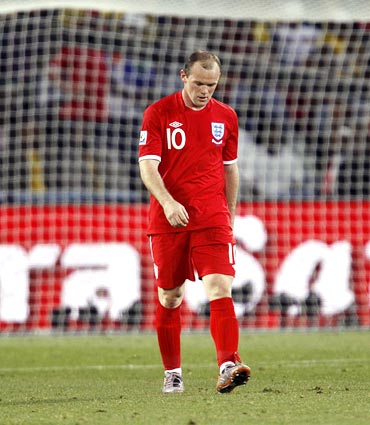 A glum-faced England arrived at the Royal Bafokeng Sports Campus for the World Cup finals dressed like undertakers in tight-fitting three-piece grey suits and wearing black ties.
A glum-faced England arrived at the Royal Bafokeng Sports Campus for the World Cup finals dressed like undertakers in tight-fitting three-piece grey suits and wearing black ties.
When they departed on Monday, it was seemingly only after they had completed the grimmest of tasks -- overseeing the decline and burial of modern English soccer at World Cup level.
Not for the first time, England failed to live up to the hype generated by a myopic media corps and the rash predictions of a manager with no previous experience of guiding a team at this level.
Fabio Capello told reporters on June 11, before the opening group game against the United States, that he was certain England would "arrive in the final on July 11".
His claim was based on his faith in a group of experienced, but ageing, players who had qualified easily, but not played well for eight months.
On Monday, instead of eating his words he groped for excuses after a finals showing that left him baffled and England's supporters feeling cheated and humiliated.
To seasoned observers, it was a familiar story, but on this occasion manifested in a more emphatic failure than any in modern times -- and some of the worst football ever played by an England team at the World Cup.
German captain Philipp Lahm said: "Maybe England were not prepared for this game as they should be -- maybe they under-estimated us because our players are not as famous as the England players."
DISMAL DISPLAYS
It was a tournament campaign of such dismal displays and results that it was widely regarded as England's worst World Cup showing since 1950 when a team of once-revered names was beaten by the unheralded United States.
The 4-1 defeat by Germany in a one-sided second round clash in Bloemfontein on Sunday was not only England's heaviest ever in the finals, but also a career-ending knell for many of the current squad's revered, if overrated, players.
In draws with the US and Algeria, a narrow win over Slovenia and Sunday's humiliating defeat by the Germans, too many demonstrated that they are not only growing old, but they have also grown too slow for modern international soccer.
Jaded, mechanical and unimaginative, they appeared to lack a love and enthusiasm for the game that was displayed so vigorously by such so-called 'smaller' teams as Chile, Japan, Ghana and Slovakia, not to mention Argentina or Brazil.
With an average age of 28.6, England were the second oldest squad -- behind Australia -- at the finals.
A besieged Capello alluded to as much on Monday when he talked of a paucity of young talent, called for a winter break in the league and claimed that his rigid 4-4-2 had nothing to do with their failure.
Capello, however, is not the main reason for this England failure even if his conservative approach deprived England of flair, verve or rhythm through the use of younger, faster players, like Arsenal's Theo Walcott or Manchester City's Adam Johnson.
PLAYER POWER
The 64-year-old Italian may be extremely well paid and treated like a celebrity but, like his players, seems to many to be a victim of a soccer culture in England, built on the financial success of the premier league, that has eroded the identity of the national team.
The clubs and their players have grown so rich that England's national team and the structure that surrounds it could be in danger of becoming almost a symbol of decadence, at the heart of which is a fateful mix of celebrity, big money, player power and media manipulation.
The perceived arrogance that gave England a self-affirmed justification for running news conferences only for hand-picked television reporters, while ignoring questions from up to 250 accredited international journalists, was just one symptom of deeper problems.
The players, cocooned in a luxurious world of their own, failed on the pitch because of rigid tactics and bad preparation -- clearly Capello's area of responsibility -- but also perhaps because of a lack of identity.
As individuals, each player seemed more synonymous with his club team than with England.
But the whole England hierarchy was responsible for the squad's apparent air of conceit and disdain towards the wider spirit of the tournament.
England's bid to host the 2018 or 2022 World Cup tournaments cannot have been helped by behaviour that alienated so many old friends and admirers.








 © 2025
© 2025